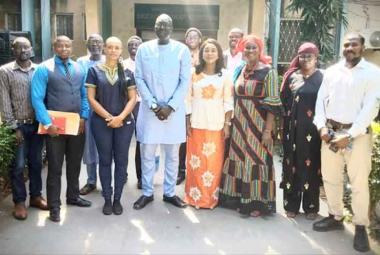By Ridhwana Ahmad Sinayoko
The National Security Bill and the Vetting Bill have successfully passed the second readings by the National Assembly, and are now advanced to the committee stage. Members of the National Assembly will soon vote to decide the future of these critical pieces of legislation.
Addressing the Assembly, the Attorney General and Minister of Justice Dawda A. Jallow emphasised the strategic importance of the bills for national security. “Security and development interests as articulated in the national development plan are paramount,” he stated. Highlighting past deficiencies, the minister said “there was a lack of joint central co-ordination for placement and intelligence gathering, leading to significant vulnerabilities.”
He also referenced a technical assessment report from August to December 2017, which underscored severe lapses in security which had led to the establishment of the Office of National Security (ONS) under the leadership of the National Security Council (NSC) members to address these issues.
Minister Jallow stressed the significance of the vetting bill in ensuring that all security personnel meet the highest standards of integrity and competence. He further explained the vetting bill is crucial to our national security framework as it establishes a rigorous process for evaluating and approving individuals who will serve in sensitive positions. “This will help prevent infiltration and misconduct within our security agencies”.
Therefore, he pointed to the National Assembly Members the need to give their blessings in accepting the bill.
The National Assembly Members expressed their unanimous support for the National Security Bill, highlighting its alignment with the government’s objectives to strengthen national security. They emphasised the critical nature of security and the government’s commitment to a robust Security Sector Reform (SSR).
The importance of proper implementation was stressed, and the need for non-political appointments to ensure the selection of the most suitable individuals for critical security roles.
Security was described as the essential foundation of the country, with a coordinated approach seen as vital for enhancing cooperation among security services. The formation of a security council was viewed as a highly effective measure to address these coordination issues.
The necessity of addressing coordination issues among the various security services was highlighted, with the welfare of the citizens being a primary concern. The Bill was seen as a solution to these issues, ensuring that the eight different security services work collaboratively. There was also advocacy for the National Security Advisor’s appointment to be overseen by the Public Service Commission (PSC).
The vetting bill was recognised as a crucial element in ensuring the integrity and competence of appointments within the security sector.
As the Bills move to the committee stage, the National Assembly will deliberate on these pivotal reforms aimed at bolstering The Gambia’s security framework







